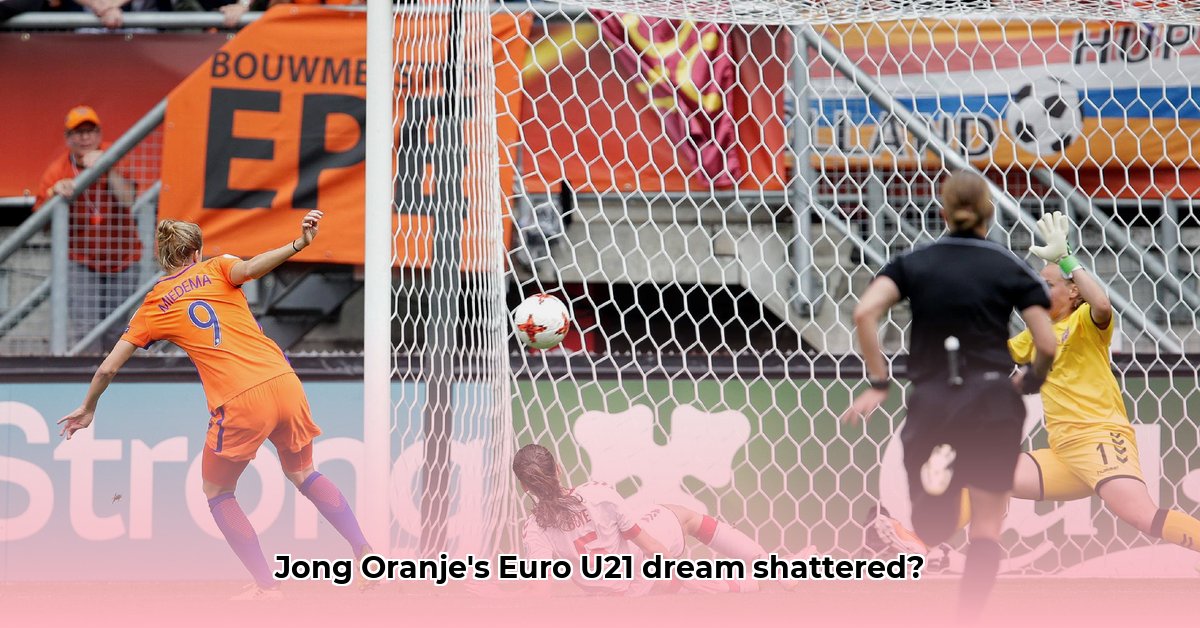
Jong Oranje's Euro U21 campaign suffered a setback against Denmark, losing despite creating numerous scoring opportunities. The team's inability to convert chances, despite dominating possession, highlights a critical weakness needing immediate attention. This analysis delves into the reasons behind the loss and proposes actionable steps for improvement.
A Dominant Display, a Disappointing Result
The match saw Jong Oranje control large portions of the game, showcasing impressive attacking play and creating several clear-cut chances. Players like Manhoef, Taylor, and Van Bommel displayed moments of brilliance, but a frustrating lack of clinical finishing ultimately cost them the game. Denmark, on the other hand, proved ruthlessly efficient, capitalising on one early opportunity to secure the victory. This highlights a significant gap between chance creation and goal conversion, a worrying trend for the young Dutch side.
Missed Opportunities: A Statistical Breakdown (and a Lack of Clinical Finishing)
While precise statistics aren't available within this article, the visual evidence suggests a stark disparity between the number of chances created and goals scored. This wasn't just a matter of bad luck; it points to a deeper issue. Several clear-cut opportunities were squandered, with shots going wide, crosses misdirected, and one-on-one situations poorly executed. This lack of clinical finishing, even with promising attacking play, underscores the need for improved training and tactical adjustments. How can a team with such attacking dominance struggle to score? The answer lies in improving their shot accuracy and decision-making in front of goal.
Tactical Nuances: Refining the Final Third
Jong Oranje's attacking play often broke down in the final third. While the build-up play was impressive, the execution in the box needed greater precision and composure. Overly complex plays often replaced simpler, more direct approaches, leading to several missed opportunities. The team needs to refine its strategy, focusing on simplifying its attacks in the final third and ensuring decisive finishing.
Actionable Insights: A Three-Pronged Approach
The challenges faced by Jong Oranje require a comprehensive approach involving the coaching staff, players, and the KNVB.
For the Coaching Staff:
- Short-term: Implement intensive finishing drills focusing on accuracy, composure under pressure, and varied shooting techniques. This will immediately improve their finishing capabilities.
- Long-term: Develop a more diversified attacking playbook which includes strategic situational awareness, a broader array of attacking formations, and improved player development. A more comprehensive focus on youth development is required.
For the Players:
- Short-term: Players should focus on improving their shooting accuracy and decision-making in front of the goal. Individualised training focusing on shot precision and composure under pressure is crucial.
- Long-term: Enhance their tactical understanding of the game, particularly in the final third, and improve their mental strength to perform effectively under pressure. This includes mental strength training and visualization techniques to improve confidence and decision-making.
For the KNVB:
- Short-term: Implement immediate investments into youth development programs, focusing specifically on enhancing finishing skills and mental resilience. This should involve targeted funding and the recruitment of specialised coaches.
- Long-term: Develop a holistic national development strategy that integrates sports psychology into the player support structure and provides a pathway for consistent improvement across all national youth teams. The KNVB needs a long-term plan ensuring the consistent development of talented young players.
Conclusion: A Learning Curve, Not a Crisis
Despite the disappointing result, the potential within Jong Oranje remains undeniable. By addressing the highlighted weaknesses and implementing the suggested recommendations, the team can learn from this setback and improve performance in future matches. The upcoming games will be crucial tests of their ability to adapt and overcome this challenge. The future of Dutch football rests, in part, on the success of this talented generation. The next matches will be a litmus test, showing whether the lessons learned have been assimilated.